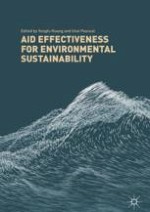2018 | OriginalPaper | Buchkapitel
4. The Effectiveness of Foreign Aid for Sustainable Energy and Climate Change Mitigation
verfasst von : H-Holger Rogner, Kei-Kit Leung
Erschienen in: Aid Effectiveness for Environmental Sustainability
Verlag: Springer Singapore
Aktivieren Sie unsere intelligente Suche, um passende Fachinhalte oder Patente zu finden.
Wählen Sie Textabschnitte aus um mit Künstlicher Intelligenz passenden Patente zu finden. powered by
Markieren Sie Textabschnitte, um KI-gestützt weitere passende Inhalte zu finden. powered by
